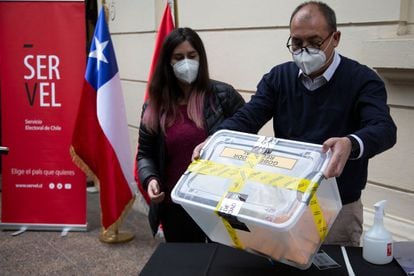Election workers hold a box with votes on March 13 in Santiago, Chile.CLAUDIO REYES / AFP
Chile begins a leap into a completely unknown future. The Assembly that the citizens will elect will have the mission of drafting a new Constitution without preconditions (except for the maintenance of the Republic) and for which there are no predictions: the discrediting of the old parties and political fragmentation allow any result. Chilean society undertakes the great change, still tense by the strong revolts of 2019 and fatigued after more than a year of pandemic. The financial markets, enraptured for decades with the ultra-liberal model inherited from Pinochetism, look with fear towards Chile.
In November 2019, when the streets were boiling with rage and there was nothing but urban devastation around the Palacio de la Moneda, the conservative president Sebastián Piñera told EL PAÍS that Chile was suffering "the malaise of success."
Up to a point, he was right.
But the macroeconomic success (high growth, sound public accounts and enormous exporting energy) had been achieved under the ultra-liberal conditions imposed by the dictator Augusto Pinochet.
The repeated chant of "Chilean success" ended up sharpening the perception that inequalities were excessive and that the alleged meritocracy had not altered the dominance of a small rich and powerful caste.
More information
"Chile has a culture in which classism persists and generates resentment and violence"
The first democratic election of governors changes the political structure of Chile
That outbreak led to this, to the current “blank sheet” situation. Confinement due to the pandemic quelled the revolt, which the very unpopular Carabineros had repressed day after day with extraordinary violence, but the discontent remained. And when Piñera, initially opposed to changing the Constitution, called a plebiscite on the constitutional process, 80% of the voters said "yes." Despite the importance of the call, on October 25 only half of the census voted. The context of the pandemic was not the cause of the high abstention, similar or even lower than that of previous calls. The fundamental cause of this endemic low participation is the discrediting of the institutions, from the Congress to the presidency through the Supreme Court and the police forces.
The first big unknown in the process that opens this weekend lies in participation.
It will probably be low for such an important stake.
Voting is also complex.
The postponements due to the pandemic have concentrated in this double-day vote, Saturday and Sunday, the election of the 155 members of the Constituent Assembly, that of 345 mayors and 2,240 councilors and that of 16 governors (so far appointed by the central power) .
The Constituent Assembly, attended by 1,178 candidates on party lists or as independents, will be for the first time almost equal (given that there are 155 members, men or women will have a majority of one) and, also for the first time, will formally include a representation of indigenous peoples, such as Mapuches or Aymara: there will be 17 congressmen.
The absence of preconditions (except for the maintenance of the Republic, respect for judicial decisions and international treaties, and the requirement that each constitutional article be approved by a two-thirds majority) opens up an immense range of possibilities. The native peoples, for example, ask that Chile define itself as a plurinational state. What most worries the economic oligarchy and the financial markets, enthusiasts of the ultra-liberal model enshrined in the 1990 Pinochet Constitution, is nevertheless the probable disintegration of a model in which almost everything, from the pension system to healthcare or education, it was yielded to private enterprise.
Pressured by the economic damage of the pandemic and by a Congress in which he was in the minority, President Sebastián Piñera had to authorize three times, much to his regret, the withdrawal of money from pension funds. That relieved the population, but substantially reduced the amount of future pensions. From the Broad Front (social democratic) and from other sectors it is advocated that the State recover the duty to guarantee, with public resources, the rights to pensions, health and education.
Apart from the great unknown about what type of Chile will be constituted during the next nine months (extendable to another three if the text is not finalized), the unknown of excess expectations opens. A new Constitution, of whatever type, will not automatically solve the underlying problems of society: the general dissatisfaction reflected in the 2019 revolt, the lack of integration of native peoples, distrust of the police forces or the enormous power of oligarchic families.
Chile is emerging from the pandemic, the first Latin American country to do so.
More than half of the citizens have received the first dose of the vaccine and more than a third are fully vaccinated.
It is not possible to know if the constitutional drafting will be carried out in a more or less calm environment or if the will to pressure the constituents will once again fill the street with protests.
Subscribe here
to the
newsletter
of EL PAÍS América and receive all the informative keys of the current situation of the region.

